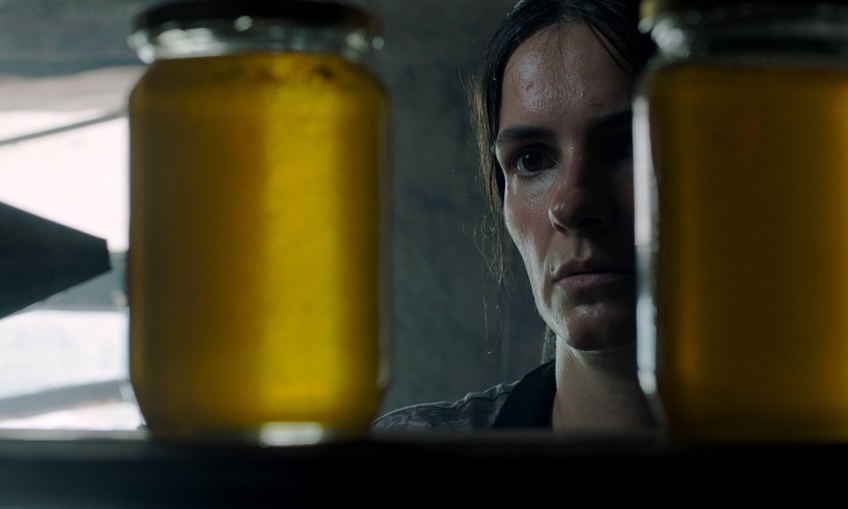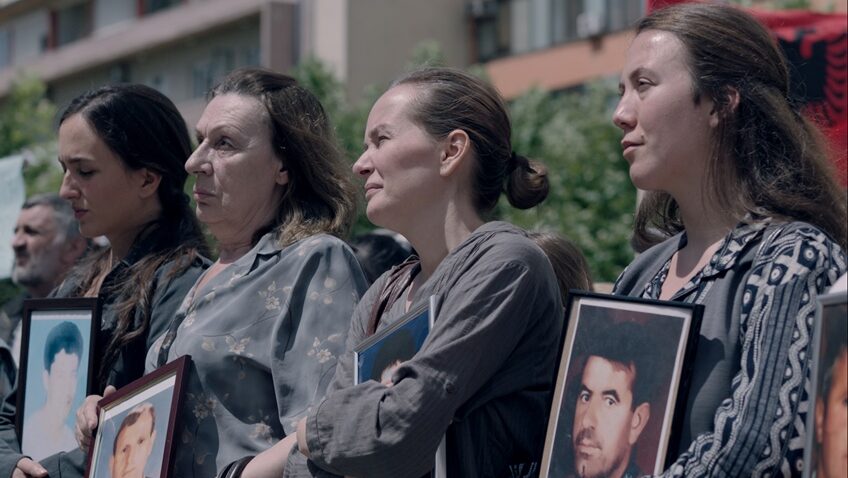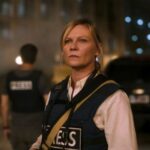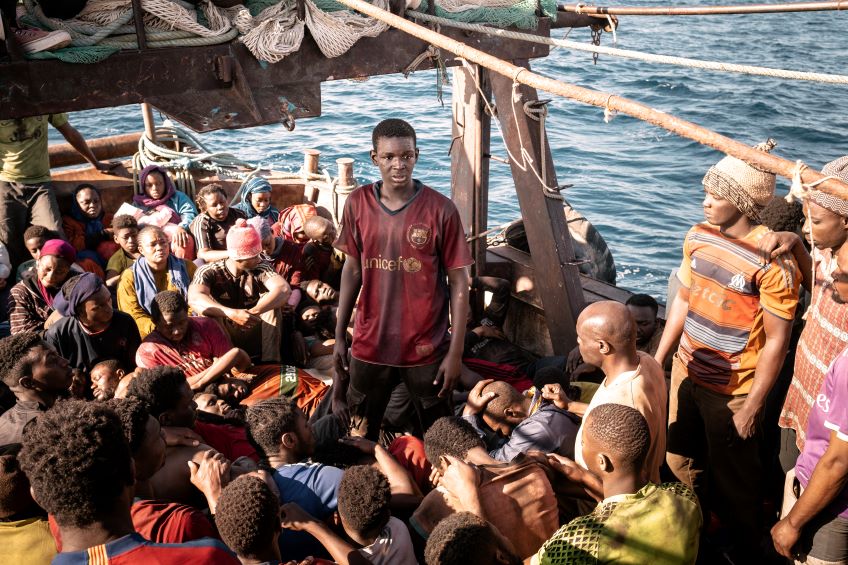Joyce Glasser reviews Hive (January 18, 2022) Cert. 15, 84 mins.
Kosovan born writer-director Blerta Basholli’s compelling feature debut is a war story without guns, bloody battlefields, uniforms, heroic soldiers or graveyards. There is, however, a courageous heroine: Fahrije, played by the remarkable, charismatic actress Yllka Gashi on whom the camera is glued until, without a word of expository dialogue, it reads her thoughts.
Like other widows and mothers of the village, Fahrije lives in limbo from month to month and year to year, when the new batches of bodies dribble into the morgue for identification. When the film opens, Fahrije climbs onto a van and begins unzipping body bags until an official in protective covering gently removes her.
The unknown fate of the men and boys missing after the Serbian massacre of the predominantly Albanian town of Krushe e Madhe in March 1999 has left the villagers frozen in the past. When Fahrije tries to sell a chain saw, which her husband, Agim, used to build beehives, her family accuse her of disrespecting his memory and giving up on him. Her love for her husband and even her fidelity are questioned. But Fahrije knows she must start building her family a future.

In the region’s patriarchal society, uncertainty and grief are not Fahrije’s major obstacles. The real-life Fahrije said in an interview, “a widow should only do housework, respect her in-laws and stay at home.” But after seven years of waiting, Fahrije, who has two children and a wheel-chair bound father-in-law, Haxhiu, (Çun Lajçi), to support, makes a decision that changes the lives of her family and fifty unemployed women.
Fahrije defies convention, malicious gossip and physical danger to take advantage of a grant to obtain a driver’s licence and the loan of a beat up car, so that she can get a job. In a meeting at the women’s centre, we hear the women’s reluctance to learn to drive is fear to their reputation, and the objection of existing relatives Fahrije, too, faces opposition at home, including from her teenage daughter, Zana (Kaona Sylejmani) who is ostracised and embarrassed at school for her mother’s activities and takes it out on her mother, even calling her a “whore.”
Fahrije’s husband, Agim, made a living as a beekeeper and she remembers that he never got stung. And the honey she produces, after suffering multiple bee stings in the process, is not of the same quantity or quality. Haxhiu struggles to bring home cash from their stall at an outdoor market.
When Fahrije is introduced to a friendly supermarket owner, she and an older, independent-minded widow, Nazmije (Kumrije Hoxha) embark on a more profitable enterprise than bee keeping. The progressive and savvy supermarket manager, half believing Nazmije’s lie that she has set up a company and is its director, realises there is a market for good tasting, homemade food. He agrees to stock the pepper-based condiment, Ajvar on a consignment basis.
The road from agreement to fulfilling it is not smooth. Fahrije fights off one supplier, Bahri (Astrit Kabashi) when he attempts to rape her. Apparently, he feels a woman driving around on her own is fair game. When she returns to pay him for the peppers, she throws the money on the ground and returns to her car. On another occasion, when the car stops at light outside a café, a male-only hang-out, someone throws a rock through her window. In a marvellous scene later in the film, Fahrije gets her revenge. An attack on the storeroom where dozens of jars have been filled, waiting to be transported to the supermarket leaves the women demoralised, but not defeated.

One of the joys of the film is watching Fahrije and Nazmije start their business and gradually attract the clandestine cooperation of the women originally too afraid of public rebuke to associate with Fahrije. Fahrije’s confidence grows as she discovers that she not only has the courage, but the procurement and managerial skills to build a company.
But it is Fahrije’s relationship with her family, that is at the core of the film. Her father in-law’s reluctance to do a DNA test to facilitate identification of any body or clothing found, is not a matter of principle, but psychological, as Fahrije realises. “We won’t kill him just by finding out” she points out the obvious, and ever-so-gradually, her fortitude brings him round. Helping the children through the process of moving forward while not forgetting is done by example.
Basholli’s style is not flashy or rushed, but distinctive. Many scenes end with a close up of Fahrije thinking, and in the following scene, or sometimes a few scenes down the line, we find ourselves in medias res, and realise we are watching what she had been thinking about.
This is the opposite of expository filmmaking. We learn almost in passing, through a broken frame on a photograph, that the house they are living in, with the plumbing falling apart, was not their home before the war. Theirs had been destroyed.
Often Basholli’s direction is like visual poetry. A beautiful close up on Fahrije’s face as she sneaks a look at her young son, Edoni (Mal Noah Safçiu) in the shower is the centre of one scene. When he tells her not to look, she reminds him that she is his mother. Edoni protests, ‘But you’re a girl,’ before grabbing the towel for cover.
Throughout this tender scene the camera stays tight on Fahrije’s face as a smile changes her features, expressing an emotion somewhere between love and pride. And just as fleetingly, that smile is infused with sorrow and pity when she realises that Agim will not be watching him grow up with her.




